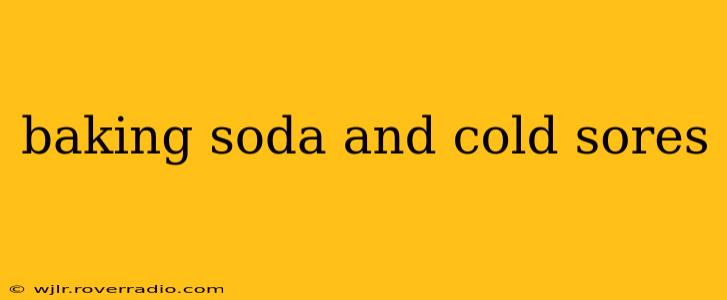Cold sores, those pesky blisters caused by the herpes simplex virus (HSV-1), are a common nuisance. While there's no cure, many seek natural remedies to alleviate symptoms and speed healing. Baking soda is one such remedy, often touted for its ability to dry out cold sores and reduce discomfort. But does it actually work, and is it safe? Let's explore.
Does Baking Soda Help Cold Sores?
Baking soda's purported effectiveness against cold sores stems from its alkaline nature. The slightly basic pH is believed to neutralize the acidic environment created by the cold sore, potentially hindering viral replication and promoting faster healing. However, scientific evidence supporting this claim is limited. While anecdotal evidence abounds, rigorous clinical trials are lacking. Many find it provides temporary relief from discomfort, but it's crucial to understand that it doesn't address the underlying viral infection.
How to Use Baking Soda for Cold Sores (If You Choose To)
If you decide to try baking soda, proceed with caution. Improper use can irritate the sensitive skin around the cold sore, potentially worsening the condition.
Method:
- Mix a paste: Create a paste by combining baking soda with a small amount of water. The consistency should resemble a thick cream.
- Apply sparingly: Gently apply a thin layer of the paste directly to the cold sore using a clean finger or cotton swab. Avoid rubbing.
- Let it dry: Allow the paste to dry completely.
- Rinse and repeat: Rinse the area with lukewarm water after 15-20 minutes. You can repeat this process 2-3 times daily.
Important Note: Never apply a thick layer or leave the paste on overnight. This can lead to skin irritation and dryness.
What are the Potential Side Effects of Using Baking Soda on Cold Sores?
While generally considered safe for topical use, baking soda can cause side effects, particularly if used improperly or excessively. These can include:
- Skin irritation: Baking soda's alkalinity can irritate sensitive skin, potentially worsening inflammation around the cold sore.
- Dryness: Prolonged application can lead to dryness and cracking of the skin.
- Burning sensation: Some individuals may experience a burning sensation during application.
What Other Home Remedies Can I Try for Cold Sores?
While baking soda might offer some temporary relief, other home remedies may be more effective or offer complementary benefits. These include:
- Ice packs: Applying ice packs can reduce swelling and pain.
- Lysine: This amino acid is believed to inhibit the herpes virus. You can find lysine supplements or foods rich in lysine.
- Good hygiene: Washing your hands frequently can help prevent the spread of the virus.
Is There a Cure for Cold Sores?
Unfortunately, there's no cure for cold sores, as the herpes simplex virus remains dormant in the body. However, antiviral medications can shorten the duration and severity of outbreaks. Consult your doctor or dermatologist for advice on antiviral treatments if your cold sores are frequent, severe, or persistent.
How Can I Prevent Cold Sores?
Preventing cold sores involves minimizing contact with the virus and boosting your immune system. Consider these tips:
- Avoid close contact: Avoid kissing or sharing utensils with someone who has a cold sore.
- Stress management: Stress can trigger outbreaks. Practice stress-reducing techniques like yoga or meditation.
- Healthy lifestyle: Eat a balanced diet, get enough sleep, and exercise regularly.
When Should I See a Doctor About My Cold Sore?
Seek medical advice if:
- Your cold sores are unusually severe or frequent.
- You experience symptoms beyond a typical cold sore, such as fever or swollen lymph nodes.
- Your cold sore doesn't heal within a couple of weeks.
- You have a weakened immune system.
Remember, while baking soda might provide some minor relief for some individuals, it's not a guaranteed cure or even a highly effective treatment for cold sores. Always consult a healthcare professional for diagnosis and treatment of cold sores, particularly if you experience persistent or severe outbreaks. This information is for educational purposes only and should not be considered medical advice.
